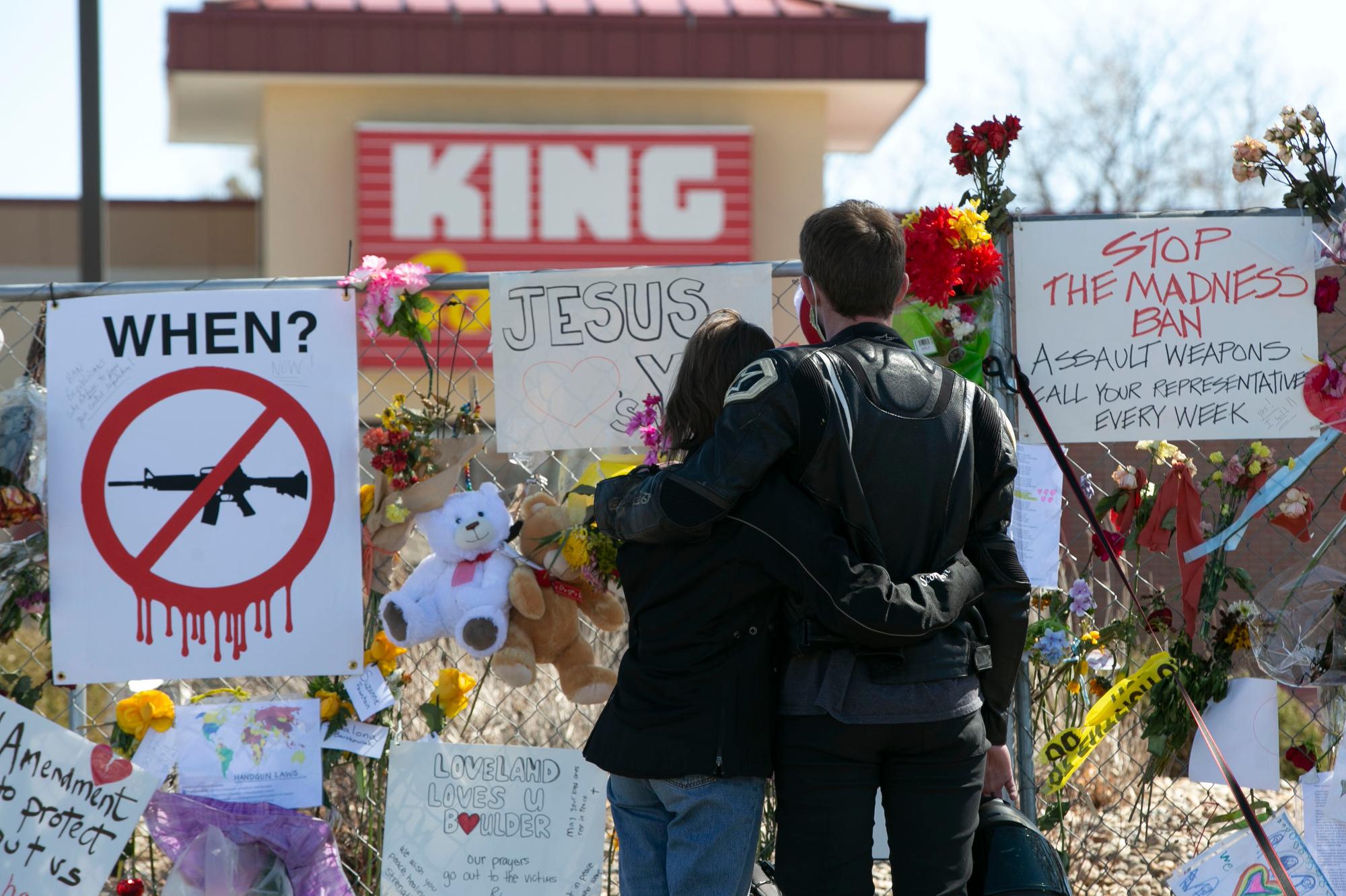
Family members of some of the people killed in a mass shooting at a King Soopers in Boulder three years ago Friday are calling for more transparency from the Colorado Healing Fund (CHF). The complaints are similar to those levied by survivors and family members of people killed in the 2022 mass shooting at Club Q in Colorado Springs.
The non-profit fund collects money for victims of mass casualty crimes in the state. It is not affiliated with the state of Colorado, but state and local leaders often encourage the public to donate to the organization as a way to securely and quickly support those in need.
Money donated to the group gets distributed through the Colorado Organization for Victim Assistance (COVA) as authorized by the Colorado Healing Fund Board. The fund also retains some of the money brought in to help meet the long-term needs of victims.
Anita Busch had a cousin killed at the Aurora movie theater shooting in 2012. She's the founder of Victim's First, a national group formed to serve victims of such violence, and is one of several advocates who have called on the Colorado Healing Fund to release more detailed financial reports and audits.
"We'd like to see exactly how much money to the penny is in the Boulder Fund," Busch said. "And where are their audits? They said they have them and they're telling us that they have them, but where are they?"

In an email, CHF Executive Director Kevin McFatridge said posting its 990s online - forms that some tax-exempt organizations submit to the Internal Revenue Service - in combination with public biannual reports for each tragedy that generates contributions, provides a comprehensive review of the funds collected and disbursed. He said CHF doesn't have the resources to provide more than that, like any sort of real-time account of the money at any given date.
"What we publish is consistent with what our peer organizations share. I’m not aware of any nonprofit that shares financial data like that in real-time. It is an interesting idea, but not at all practical," McFatridge said.
The most recent biannual report from the Colorado Healing Fund related to collections and disbursements for the 2021 Boulder shooting covers July through December 2023. The report was only recently published, a delay McFatridge acknowledges.
According to the report, CHF collected more than $4.8 million in total donations in the active lifetime of the fund dedicated to the Boulder victims. Donations are no longer being collected.
Of that $4.8 million, CHF retained roughly 4.6 percent or $221,000 for administrative fees. The document shows $3.7 million total has gone toward what the organization deems victim needs, the bulk of which went to COVA as cash to the families of victims and others named in the criminal case.
Still, that disbursement amount is a decrease from the previous biannual report. McFatridge said that's because the amount of money pledged specifically for the Boulder Strong Resource Center decreased.
The fund originally planned to give more than $950,000 to the resource center. That number is now $524,495, all of which is accounted for in the $3.7 disbursement amount. But so far, just over $160,000 has been given toward the center.
"I believe the BSRC determined that the original amount was higher than necessary," McFatridge said, noting that the decision was made prior to his time as executive director.
'Clean' audits from CHF but victims call for more transparency
McFatridge joined CHF in July 2023, following the departure of former Executive Director Jordan Finegan in March of the same year. Finegan served in the role for four years before stepping down.
There is $1.1 million left in the Boulder fund, about 3 percent of which will go toward the remaining pledge to the BSRC, according to McFatridge. CHF said it will use the remaining $830,000 money to address immediate and long-term needs as they arise, per its model.
Anita Busch said that plan further traumatizes the people it's meant to help, because as long as there's money in the fund, people will have to ask for it.
"People do not want to be beholden to people they do not know for the rest of their lives," she said. "These are adults who pay their bills, know how to pay their bills, and they shouldn't have to go and ask for money that was already intended for them."
In addition to the biannual reports and 990s, CHF states on its website that third-party audits in 2020, 2021 and 2022 found the finances were "clean," with no evidence of wrongdoing. The 990s detail public support CHF receives by year, but do not break the group's finances down by which mass casualty event generated certain funds. The biannual reports make that distinction, but Busch and other victim advocates say the information should come more often than twice a year.
In November, Busch and Victims First sent an open letter to Colorado Gov. Jared Polis and a half-dozen other political figures calling for the state to shut down the Colorado Healing Fund and create a state-run fund in its place. 60 people who are either survivors or family members of victims of the mass shootings at Club Q, Sol Tribe Tattoo & Piercing and the Boulder King Soopers signed the letter.
The letter highlighted what they see as inconsistencies between funds collected for different mass casualty events. Specifically, the letter said CHF chose to release all of the donations it collected for Club Q "only after the persistent outcry from victims’ families, survivors, and victim
advocates." That decision is a departure from CHF's model and differs from what is happening with the Boulder fund as money is still be retained.
McFatridge said the CHF board decided to release all of the money raised for Club Q victims because the organization felt the immediate needs were greater than the anticipated long-term needs. He said survivors calling for the funds to be disbursed was not a primary motivation.
He also said that the organization is still retaining money for those impacted in Boulder in anticipation of a criminal trial. The accused shooter in the Boulder case is headed for a criminal trial starting in August. There were no criminal trials for the shootings at Sol Tribe or Club Q.
"We expect that event and the significant media coverage to cause additional trauma to those directly affected by the shooting. And we want to have resources available to meet those needs," he said. "When we collect money from donors, we are clear that our model is to meet the immediate, intermediate, and long-term needs of survivors, victims, and families of the deceased. We have an obligation to honor that."
Busch argues that the model is problematic.
"When you go through a mass shooting, you feel a loss of control and part of getting your mental health back is getting that control back. And they're doing the opposite of that," Busch said.
Jody Waters was one of the 10 people killed in the Boulder King Soopers shooting. Chuck Hunker is the father of her children. He said the families of the victims deserve to know exactly how much money has been collected.
"We want to see the audits," Hunker said. "And they should close out the fund and distribute the money to the 10 families. That's what I would like to accomplish."
Hunker said multiple attempts to get information from the fund have fallen flat. He wants clarity on how CHF defines "victims" in mass casualty events, as well.
McFatridge said CHF works with named victims as identified by the local police departments and/or district attorney's offices.
"Is it the 10 families? Those named in the lawsuit? Employees of King Soopers, the public at large?" Hunker said. "I think the 10 families should be the final recipients. No money should be held back," Hunker said. "The families need closure on this part of the tragedy. It certainly isn't coming from the courts."
For its part, McFatridge said CHF is working to accommodate the needs of the people it serves. He said the fund is moving toward dispersing money to victims in bulk amounts, rather than smaller increments for individual needs.
"That is a change we are making for future activations, and it is directly in response to what we have heard from victims, survivors, and families of the deceased," he said.









